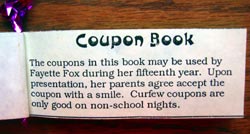|
|
December 11, 2013
I originally wrote a version of this essay back in ’05 BT (before Twitter). People have requested a reprint. Here you go. Enjoy… in joy.
The year our daughter Fayette turned 15 she said she didn’t want us to buy her “stuff” for Hanukkah. Huh? What was going on? Didn’t she still love us? Wasn’t she grateful for the many carefully selected gifts she’d received since… birth? Was she running away and needing to travel light?!
 Get creative with those coupons The truth was less sinister and more profoundly personal. As she put it, “I’ve had it with holiday commercialism.” This led to a lively family discussion about Needs vs. Desires. Form vs. Substance. Carnivores vs. Vegetarians.
NOTE1: Our son Ezra was then 9 and while he dearly loved and coveted all kinds of “stuff,” (except when it came to clearing it off the floor) he agreed his sister’s idea merited serious philosophical consideration.
NOTE2: Ezra now holds an undergraduate degree in philosophy.
Despite a holiday moratorium on buying stuff there were no restrictions on loving acts of giving. So we each faced the creative challenge of figuring out what to give. That first year we abandoned traditional gift-giving our tokens of affection and admiration became more experiential and far-reaching. There were live performances and other cultural outings, food factory tours, waterfall hikes, baked desserts, multi-media presentations, and hand-crafted treasures. But the best innovation was the advent of personalized coupons books, i.e., hand-made packets offering a variety of customized “goods, services and special privileges.” The key to coupon success is knowing your recipient.
Fayette, who frequently got busted for talking on the phone after lights out, was thrilled to get: “This coupon entitles you to use the phone between 11-11:30 on a school night. Homework and all getting ready for bed preparations must first be completed.”
Ezra, who has always loved sweets, got: “This coupon entitles you to 2 dozen of your choice of home-made cookies that you don’t have to share with anyone (unless you happen to be feeling particularly generous). Minimum 24 hour notice required.”
 "Goldfish Tea" by Fayette Fox I remember happily receiving: “I will water all the plants in the house for you for 1 week.” And David, who spends lots of time hunched over his computer keyboard, was delighted to get: “I will give you a 10 minute shoulder massage.”
Just to be clear, I’m not proposing a “No Buy” Zone. We’re emerging from tough economic times and retailers (large and small) are hoping we’ve regained enough confidence in our future earning power to do our part for the recovery. The Don’t Buy Me Any Stuff” Gift Guide is not an all or nothing deal. Let’s face, there is very cool stuff in stores. And sometimes the special something your kid craves is just what you want to give, and if you can, go for it. Then knock yourself out on the kid’s joy when he/she receives your gift. All I’m saying is that you are not and never have been required to go into debt buying stuff that’s out of synch with your innate sense of what’s appropriate and healthy for your child.
So, if you’re looking for extra meaning this holiday season and a little less wear and tear on your family values, talk to your kids about alternatives to traditional gift-giving. It may not be coupons, but your family will likely come up with all kinds of great ideas. When we explore more creative ways to show our love for each other, we celebrate the uniqueness of each of family member. Now there’s a gift!
 Happy holidays from our family to yours

December 9, 2013
The following article is excerpted from my book: Teaching Kids to Be Good People
 Teach ’em to give back For the first few years of life kids aren’t always capable of telling us exactly what they want. Which is why helpful, loving parents and grandparents pepper the little ones with questions that often begin with: “Do you want _______?” Since it’s too early for real conversations, grownups fill in the blanks:
- Do you want to play with this?
- Do you want a story?
- Do you want to go to the park?
- Do you want Mint Chip or Jamoca Almond Fudge?
Our every childish wish becomes our parents’ command. That’s why we quickly we learn to say “I want _______.” Being a little kid is a sweet gig until the day when a parent says, “NO” to one of our demands, and our little brain explodes:
“What did you say?! What do you mean it’s too close to dinner? What do you mean it costs too much and you won’t buy it for me? This is outrageous!!”
We don’t have all those words, so we reiterate the obvious for stupid Mommy/Daddy:
“BUT I WANT IT!!!!!”
Tantrums don’t always work, but they work often enough for little humans to keep hope and self-centeredness alive.
At age three we tend to become more aware of the power dynamics within our family and start testing boundaries. That’s the time a parent’s “Do you want ______?” may take on a sinister ring:
- Do you want me to take that away from you?
- Do you want a time out?
- Do you want me to lose your snack?
- Do you want me to give you something to cry about?
That last rhetorical question was surprisingly popular amongst certain parents during the second half of the last century. Hopefully it’s gone the way of the landline, but I’ve got no empirical data either way.
Obviously all those years of “Do you want _______?” congealed in the spongy language and reward centers of our brain where we realize how important our happiness is to Mom and Dad. Because we are all about making it easy for them to please us, our demands become very specific as do our reasons for why they ought to be met . . . NOW:
“I want __________. And yes, I am old enough!”
“I want __________. ’Cause I’m the only one who doesn’t have one!”
“I want a new __________. ’Cause my old one sucks!”
“I want you to give me what I want, and I want you to leave me alone.” (Double demand . . . impressive language development!)
And so, for those of us who grew up in comfortable circumstances (that would be you with the latte in hand), it stands to reason we may need an attitude transplant to progress from “I want to get” to “I want to give.” But we can do it! We have the technology to connect with organizations doing awesome work. We have credit cards that make spending less painful.
Any time is a good time to look around and see where you could spread a little sunshine and some green. December is an especially good time. Some of my personal favorite do-great .orgs are Oxfam America, Good Weave, Doctors Without Borders, and Kiva. And there are at least a million others effectively working on solutions to local, national, and international challenges. Giving to any of them makes you (and any entitled kid you want to inspire) part of the solution. Start your search with the Charity Navigator and find out whose efforts you and your family want to support.
Warning—Giving can become habit forming, but in a healthy way. Besides, do you and your kids really need more stuff or might you be in the market for some good karma points?

December 4, 2013
Lots going on this time of year. (Props for taking time to read a blog.) We feel pressure to make the holidays “perfect.” Pressure to spend. Pressure to save. Pressure to get the kids to behave. We all have moments when we trade “nice” for B#$@%. We’re human and we get stressed. But when we show more Beast than Loving Parent, we are damaging our children. That’s a problem that keeps making problems. The good news? We are key to the solution.
The following article is an excerpt from my book: Teaching Kids to Be Good People (If you’re interested, it’s 50% off for the holidays Code 3MZQS83F)
I had the pleasure of interviewing Rachel Simmons the Wise for my podcast series. We talked about her book The Curse of the Good Girl: Raising Authentic Girls with Courage and Confidence. We also discussed how often parents engage in meta-conversations with their children (i.e., parent says one thing and an unspoken message churns just below the surface).
With all that doublespeak how can a t(w)een learn to be authentic and express the truth of her heart? Not very easily. And it isn’t just parents and daughters. As Rachel put it, no matter who you’re talking to or what relationship you’ve got, “there’s always a meta-conversation going on.”
Parent: Oh, you’re still playing that game.
Meta-message: I just know you won’t get your homework
done tonight and then what? You think I like being on your case? Well, I don’t! But if I don’t keep after you how are you ever going to get into a decent college?
Mini meta-message: You’re lazy and I’m disappointed in you.
________
Parent: Don’t you think your other jeans would look better with that top?
Meta-message: Those jeans are too tight and too low cut. They make you look fat and slutty. What will Grandma say when she sees you wearing that? She’s going to think I’m a terrible mother to let you dress that way!
Mini meta-message: You’re fat and you embarrass me.
________
Parent: How’s your buddy Ryan these days?
Meta-message: Are you two still friends? Did something
happen between you? Are you now hanging out with people I should be worried about? (Sigh) You and I used to be able to talk about stuff. Now you don’t tell me anything. What else are you hiding from me? Maybe I don’t even want to know!
Mini meta-message: You’re disloyal and untrustworthy.
________
I’ve been thinking about meta-messages and how I use them. Whether they’re conscious or not, communication patterns between people often determine who we like to hang out with and who doesn’t make our FAVS list.
 Josie 2009-2012 During the holidays a few years back, Josie and I snuck out of the house before anyone else was up. Because she was still full of puppy beans and needed her off-leash time, we headed for the nearby hills. She instantly vanished through the trees tracking deer and squirrels and nosing the underbrush for ticks thumbing a ride. While she was gone I walked on, enjoying the quiet light and the colors. Every so often I’d whistle for Josie and she’d reappear, sometimes from behind me on the trail, sometimes way ahead. We’d smile at each other and wag our tails. “Yes! Good dog!” Then I’d give her a treat. After each reunion she’d take off again and I continued hiking.
So it went for an hour. When I finally put her back on leash I thought about the meta-conversation we had and why Josie happily kept returning to me. The way I figure, it comes down to this . . . each of us, dog and human, prefers to hang with those who tell us we are good dogs.
It also helps if they give us treats.
_______________
We’re in the darkest days of the year, so how about lightening up? Catch someone you love in the act of doing something right. Drop the meta-messages and smile.

December 2, 2013
 Let there be light and laughter and love Most of us don’t remember what our nearest and dearest gave us last year for a holiday gift. (Unless it was nada when we expected mucho. In that case we’ve still got those hurt feelings to cherish always.) We probably can’t remember what we gave them either!
We’re wired to remember how we feel. What was in the box… not so much. So why spend all the time and money stressing about, shopping for, then wrapping and delivering stuff for the most precious people on our list? Because we love them!
If we could, we’d show our love with every interaction. If we could, we’d tell our kids, “My life is enriched beyond measure because you are my child. I am grateful for my relationship with you. I love teaching you and learning from you. I understand who you are and I respect your uniqueness. All that you bring to this family is precious to me.”
Unfortunately we don’t know how to say any of that, so instead we give them stuff. And sometimes, when carefully chosen, the material gifts we give actually manage to transcend their innate stuffness.
When I was 15 my mother gave me a guitar for Chanukah. She’d “purchased” it with thousands of saved up S & H Green Stamps. Mom seemed to know exactly what my soul would respond to and her gift led me to new realms of self-expression and self-discovery. Playing music and singing became such a part of my identity that as a 22-year old teacher’s aide, my students presented me with a birthday cake in the shape of a guitar.
Curious about other peoples’ experiences, I asked a few folks to describe a very special gift they received as a child:
“When I was 9 my Dad & Mom gave me my first bike. I was so touched and happy because we had just moved and I knew times were very difficult for them. My first car was not as exciting.” R.C.
“When I was 5 my parents gave me a box of new crayons, which I enjoyed so much, lying on the floor coloring by the warm fireplace.” A.M.
“When I saw and smelled my first magnolia blossom I asked my parents if we could get a magnolia tree. They bought me one and as a family we planted it together in the yard. I now live 3,000 miles away from my parents’ home, but I still love to “visit” the magnolia tree whenever I’m there.” T.R.
“When I was a teen, my parents gave me a wooden box that looked like a pirate treasure chest. I think it held something that was supposed to be the real present, but I’ve long since forgotten what. But the box itself immediately became my favorite repository for special keepsakes. I’ve passed it on to my daughter who quickly put it to the same use. It gives me a happy glow to see it on her bookshelf.” N.F.
At the start of this gift-giving season, talk to your kids about what’s most important to each of you. Share your own stories about special gifts you’ve received. Think about ways your family can help others either locally and/or globally. Plan special time together – the best gift of all.
When you give, remember that your gift is an opportunity to show your deep understanding of and appreciation for the recipient. Gift-giving is all about love. Love is the gift. And if you choose wisely, something in a box may go straight to the heart.
 Enjoy... in joy

| |


















